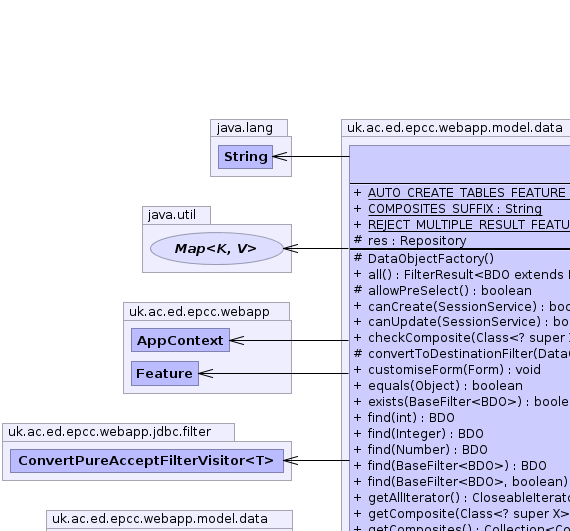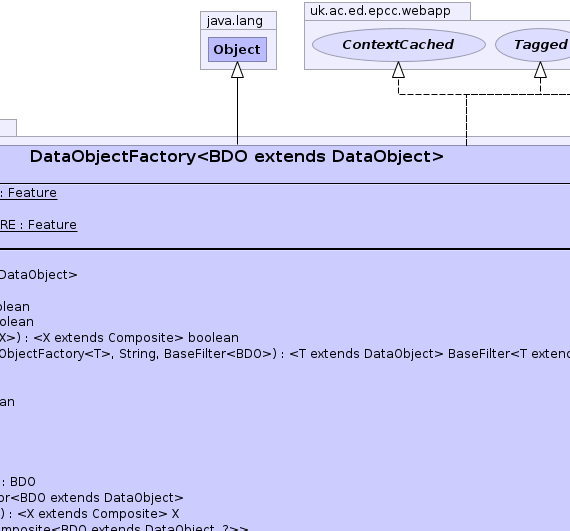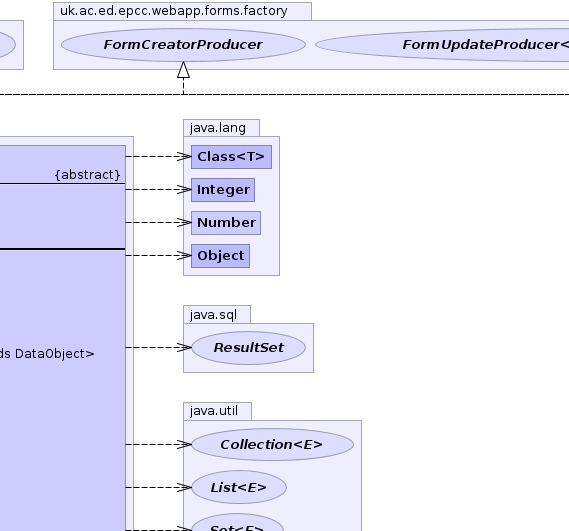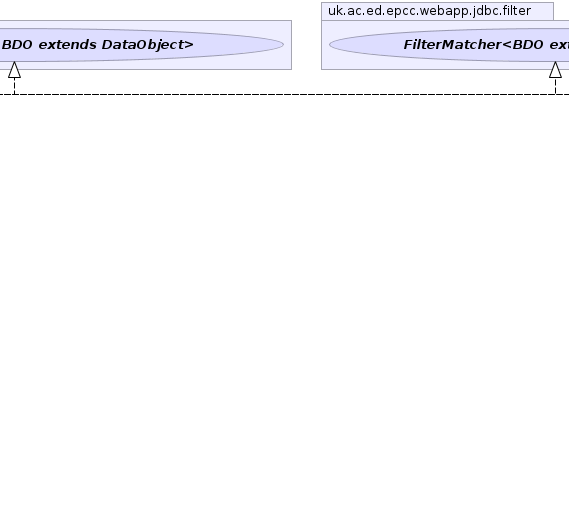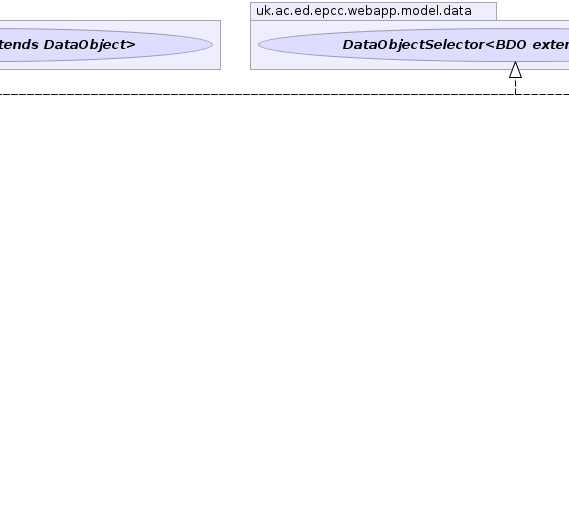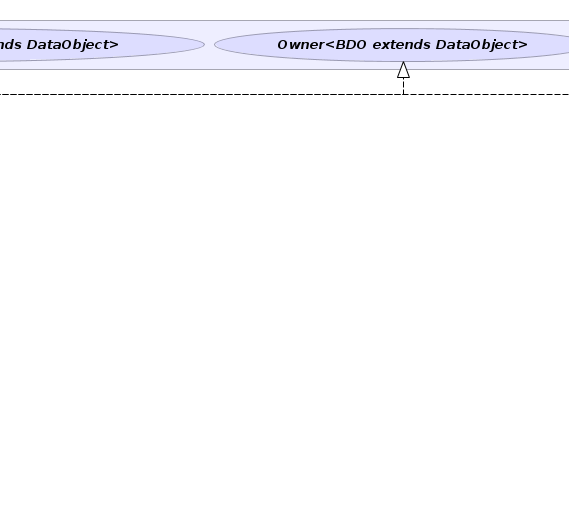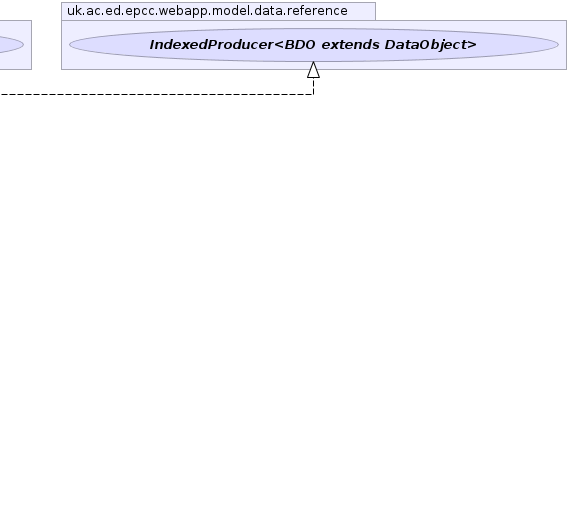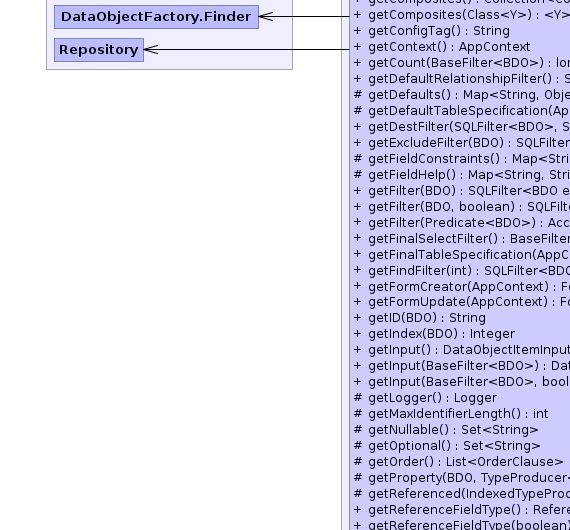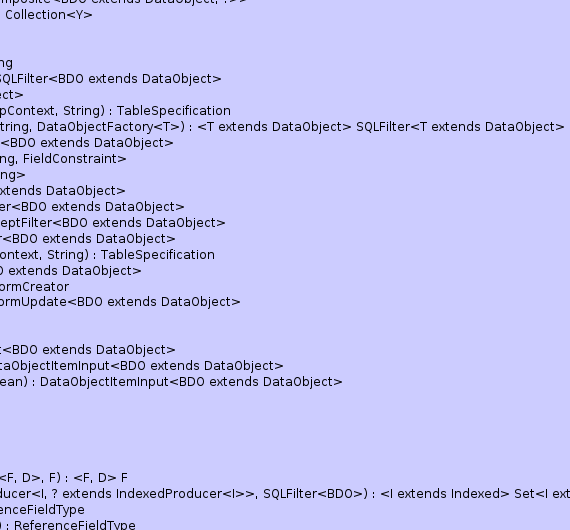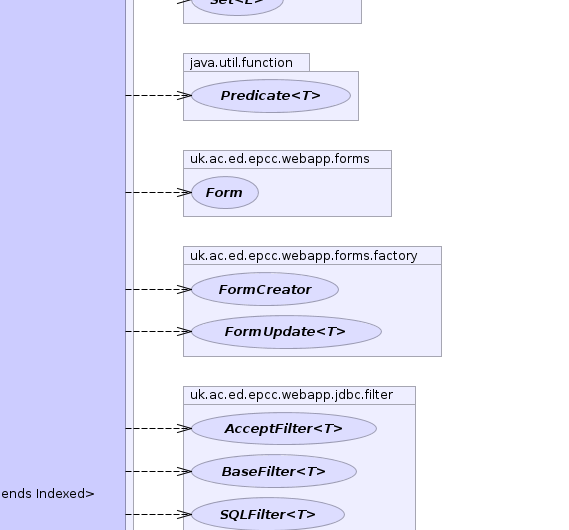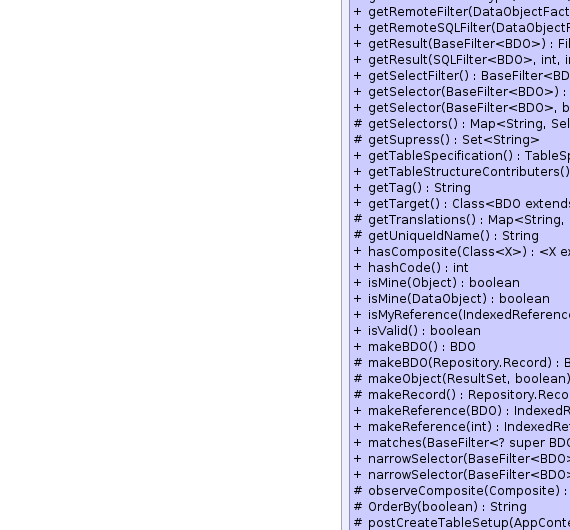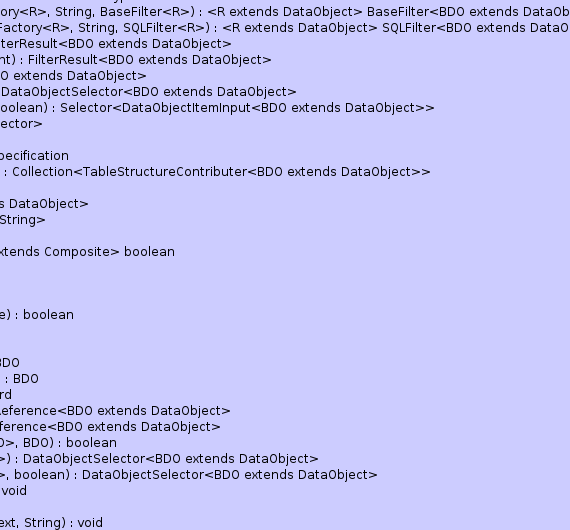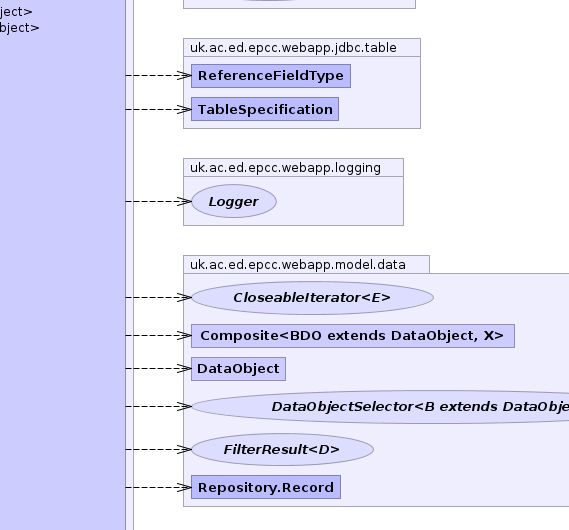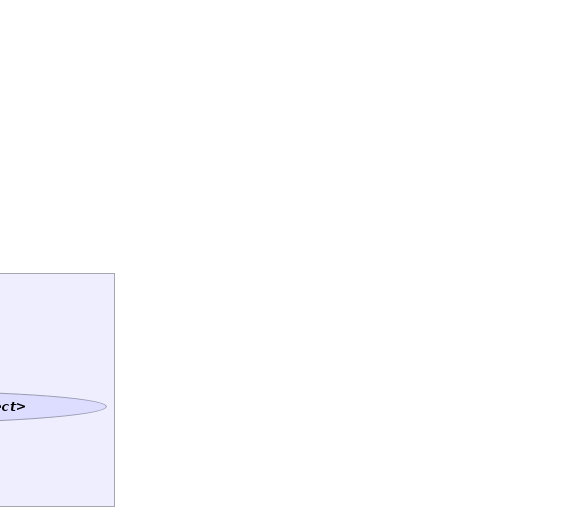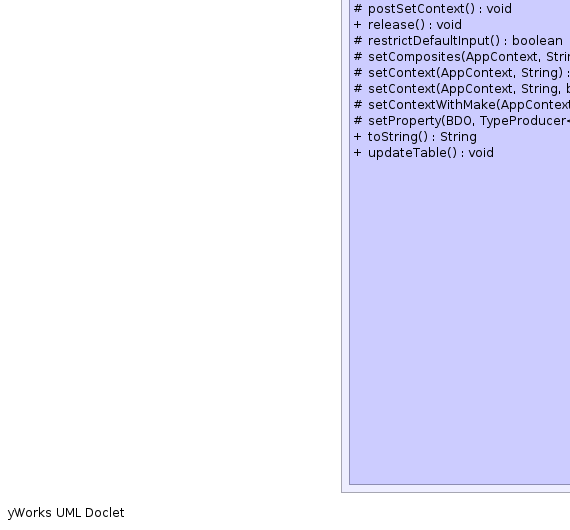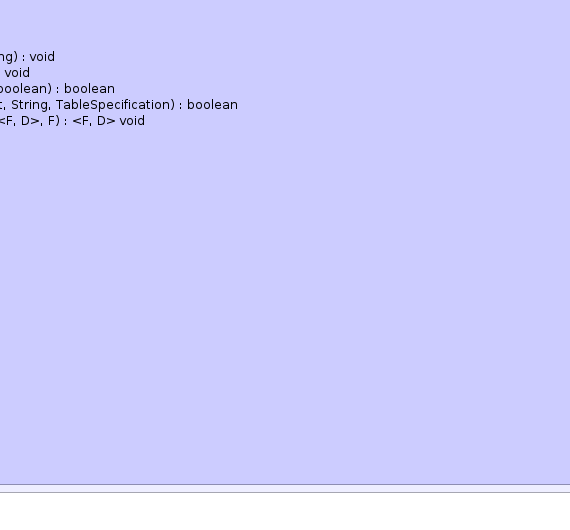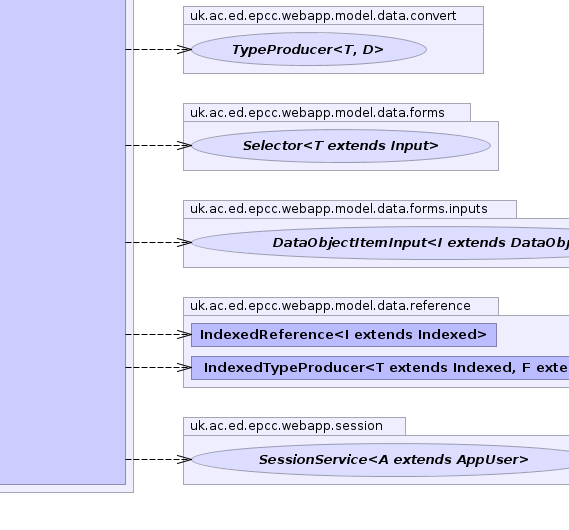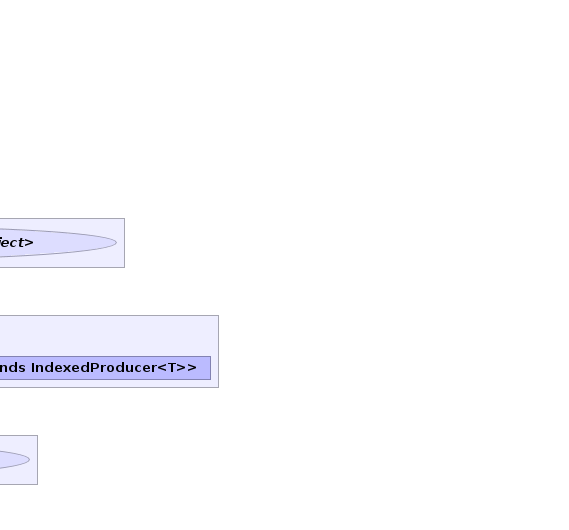- java.lang.Object
-
- uk.ac.ed.epcc.webapp.model.data.DataObjectFactory<BDO>
-
- Type Parameters:
BDO- type produced by factory
- All Implemented Interfaces:
- Contexed, ContextCached, FormCreatorProducer, FormUpdateProducer<BDO>, FilterMatcher<BDO>, TypeConverter<BDO,java.lang.Number>, DataObjectSelector<BDO>, Selector<DataObjectItemInput<BDO>>, Owner<BDO>, IndexedProducer<BDO>, Tagged, Targetted<BDO>
- Direct Known Subclasses:
- AbstractMessageHandlerFactory, AbstractRequestFactory, AbstractUserSettingFactory, AppUserFactory, BadKeyFactory, ClassificationFactory, DataObjectDataProducer, FileDataFactory, HistoryFactory, IndexedLinkManager, LogFactory, MessageData.Factory, MultiLinkManager, MultiNameFactory, PartConfigFactory, PartOwnerFactory, PropertyFactory, ResponseManager, TextDataFactory, TextFileOverlay, WtmpManager
public abstract class DataObjectFactory<BDO extends DataObject> extends java.lang.Object implements Tagged, ContextCached, Owner<BDO>, IndexedProducer<BDO>, DataObjectSelector<BDO>, FormCreatorProducer, FormUpdateProducer<BDO>, FilterMatcher<BDO>
Factory object for producing DataObjects. This is an abstract class that is sub-classed to produce a factory for a corresponding sub-class of DataObject.The advantage of using a Factory class rather than static Factory methods is that we can inherit the methods in a equivalent Factory hierarchy rather than having to re-implement them in the static factory methods of each DataObject.
There is a single abstract methods that need to be implemented in the derived Factories:
-
makeBDO(Record)Which constructs an object of the target type.
getTarget()method should also be overridden to improve run-time type checking. This is so simple that in principle we could have a genericFactory class that implements them using reflection from a Class object passed to the constructor but this is probably overkill for the moment. Note that Factory is only concerned with retrieving records from the database. It can therefore be used with read-only tables populated from elsewhere.Before a DataObjectFactory can be used the AppContext and database table name needs to be initialised using the
setContextmethod. To avoid the possibility of having invalid instances non-abstract sub-classes should implement constructors that invoke setContext.Normally each class has its own database table. It is possible to implement several tables mapped using the same class by specifying a table name to the Factory constructor. If a class is only to be used with a single hard-wired table the table name can be set to a constant within the constructor.
It is also be possible to implement a class hierarchy that shares a single table with different classes identified by a table field. In this case we use a single factory class that produces the base class of the hierarchy. However the
makeBDO(Record)method will have to know about all of the sub-classes so as to be able to call the correct constructor. This works best with classes that are always created from the Factory (e.g. inner classes of the Factory) as it is not possible to have similar behaviour when objects are created directly from a constructor without passing the table name throughout the code.DataObjectFactoryis generic, parameterised by the type of theDataObjectsub-class it produces. This reduces the need to introduce casting when using inherited factory methods. Casting may still be required if the Factory can produce multiple target types as the generic parameter will only specify the common superclass. If a sub-classes are going to be extended further they should also be generic:
In this case avoid making the DataObject a true inner class of the Factory. This would make the DataObject generic parameterised by itself and can lead to subtle implementation issues. Instead make is a pseudo-inner class where we add an explicit reference to the Factory (set via the constructor) and definepublic class ThingFactory<T extends Thing> extends DataObjectFactory<T>{ ... } public class Thing extends DataObject{ ... }makeBDO(uk.ac.ed.epcc.webapp.model.data.Repository.Record)to set this reference.DataObjectFactories can be used to retrieve individual DataObjects (using the various
findmethods) but are normally used to return sets of DataObjects. These sets are normally specified using a filter (see the interfaces in uk.ac.ed.epcc.webapp.jdbc.filter). These sets may be very large, too large to all fit in memory at the same time. TheDataObjectFactory.FilterIteratorclass (an inner class of DataObjectFactory) is therefore used to iterate through the values.The
DataObjectFactory.FilterSetclass is a simple wrapper round aDataObjectFactory.FilterIteratorthat implementsIterableand is therefore more compatible with the java-5 extended for-loop syntax. ThegetResult(BaseFilter)method returns aFilterSetcorresponding to a filter.This class also implements
Selectorwhich means that it can provide a default formInputfor the type of object it creates.A
DataObjectFactorycan provide aTableSpecificationthat is used to create the database table if the table is missing when the factory is created. This allows code to bootstrap into an empty database. This behaviour is controlled by the auto_create.tables feature. In generalDataObjectFactoryadapts to the existing structure of the database table. Missing fields will be ignored. Additional fields will be handled using default behaviour. If the table editing transitions are enabled missing fields from the default table specification can be created via the forms.The
Compositeclass is used to extendDataObjectFactorys by composition rather than extension. Use this class where the sets of fields in the same table implement unrelated functionality or when a required behaviour has multiple possible implementations. AllComposites take the factory as a constructor argument. This then calls a register method to register them with the factory. ACompositemay be registered in one of two ways.- A static field in the factory can contain a
Composite. As these are initialised before theAppContextis set theCompositeconstructor is unable to use theAppContext. - A list of
Compositenames can be specified in the configuration parameter table-tab.composites. These can be either classdef. or class. definitions. If a constructor with the signature (factory, String) exists then theCompositetag name will be passed to the constructor. In this case theAppContextis available to the constructor.
-
-
Nested Class Summary
Nested Classes Modifier and Type Class and Description classDataObjectFactory.AbstractDataObjectInputA form Input used to select objects produced by the owning factory.protected classDataObjectFactory.AbstractFinder<X>protected classDataObjectFactory.DataObjectAcceptFilterabstract sub-class for implementingAcceptFilterfor this factory.classDataObjectFactory.DataObjectInputA form Input used to select objects produced by the owning factory using the record idclassDataObjectFactory.DataObjectIntegerInputA basic form Input for selecting objects using their ID value as text.classDataObjectFactory.DestAcceptFilter<T extends DataObject>AnAcceptFilterversion of DestFilterclassDataObjectFactory.FilterAdapterAResultMapperfor generating targetDataObjectsclassDataObjectFactory.FilterCounterclassDataObjectFactory.FilterExistsclassDataObjectFactory.FilterIteratorIterate over BasicDataObjects generated by a filter.classDataObjectFactory.FilterSelectorprotected classDataObjectFactory.FilterSetSimple wrapper round a Filter that implementsIterableThis makes it easy to re-create aDataObjectFactory.FilterIteratoror to use a Filter in a for-each loop.classDataObjectFactory.FinderclassDataObjectFactory.MakeRemoteFilterVisitor<R extends DataObject>AFilterVisitorfor making a local filter from a filter on a referenced table.protected classDataObjectFactory.MatchFilterFilter to select Objects that match against a field of a peer objectclassDataObjectFactory.ReferencedAdapter<I extends Indexed>ResultMapper that generates the set of objects referenced from the targets selected by the filterclassDataObjectFactory.ReferenceIterator<I extends Indexed>Iterator that iterates over the set of objects referenced by the targets selected by the filter.classDataObjectFactory.SortingDataObjectInputstatic classDataObjectFactory.TimeAcceptFilter<T extends DataObject>protected classDataObjectFactory.TimeFilter
-
Field Summary
Fields Modifier and Type Field and Description static FeatureAUTO_CREATE_TABLES_FEATUREstatic java.lang.StringCOMPOSITES_SUFFIXstatic FeatureREJECT_MULTIPLE_RESULT_FEATUREprotected Repositoryres
-
Constructor Summary
Constructors Modifier Constructor and Description protectedDataObjectFactory()Construct an uninitialised DataObjectFactory The object will not be usable until setContext is called.
-
Method Summary
All Methods Instance Methods Abstract Methods Concrete Methods Modifier and Type Method and Description FilterResult<BDO>all()Get an Iterable over all contents of a tableprotected booleanallowPreSelect()return the default pre-select behaviour for inputs generated by this class.booleancanCreate(SessionService c)Can the producer provide a FormUpdate for the current user.booleancanUpdate(SessionService c)Can the producer provide a FormUpdate for the current user.<X extends Composite>
booleancheckComposite(java.lang.Class<? super X> clazz)protected <T extends DataObject>
BaseFilter<T>convertToDestinationFilter(DataObjectFactory<T> remote_fac, java.lang.String link_field, BaseFilter<BDO> fil)Convert a BDOBaseFilterinto aBaseFilteron a referenced factory.voidcustomiseForm(Form f)Extension hook to allow additional Form customisation generic to all types of Form For example adding a FormValidator or adding min, max values to NumberInputs.booleanequals(java.lang.Object obj)booleanexists(BaseFilter<BDO> s)BDOfind(BaseFilter<BDO> f)find an object based on a filterBDOfind(BaseFilter<BDO> f, boolean allow_null)Find an object based on a FilterBDOfind(int id)Get a single object via its unique id.BDOfind(java.lang.Integer id)get a single Object via its unique id as a number.BDOfind(java.lang.Number id)Find the required object.CloseableIterator<BDO>getAllIterator()get an Iterator over all contents of a table<X extends Composite>
XgetComposite(java.lang.Class<? super X> clazz)get a specificCompositebased on its registration type.java.util.Collection<Composite<BDO,?>>getComposites()get allComposites for this factory.<Y> java.util.Collection<Y>getComposites(java.lang.Class<Y> template)Get all composites that are assignable to a particular type.java.lang.StringgetConfigTag()Return the tag used to qualify configuration parametersAppContextgetContext()longgetCount(BaseFilter<BDO> s)count the number of records selected by a FilterSQLFilter<BDO>getDefaultRelationshipFilter()Get aSQLFilterto use as the default target for relationship filters.protected java.util.Map<java.lang.String,java.lang.Object>getDefaults()Generate a set of default property values.protected TableSpecificationgetDefaultTableSpecification(AppContext c, java.lang.String table)Get the default table specification if the table is to be created.<T extends DataObject>
SQLFilter<T>getDestFilter(SQLFilter<BDO> fil, java.lang.String join_field, DataObjectFactory<T> join_fac)Default filter for use when we want to select remote objects referenced from this table with a select clause on this table.SQLFilter<BDO>getExcludeFilter(BDO obj)protected java.util.Map<java.lang.String,FieldConstraint>getFieldConstraints()get theFieldConstraints to apply in creation/update formsprotected java.util.Map<java.lang.String,java.lang.String>getFieldHelp()return a class-default set of help-text for form fields.SQLFilter<BDO>getFilter(BDO target)get a filter that selects a particular target object.SQLFilter<BDO>getFilter(BDO target, boolean exclude)get a filter that selects/excludes a particular target object.AcceptFilter<BDO>getFilter(java.util.function.Predicate<BDO> p)convert aPredicateinto anAcceptFilterIn generalSQLFilters are preferable as they filter at the SQL level.BaseFilter<BDO>getFinalSelectFilter()TableSpecificationgetFinalTableSpecification(AppContext ctx, java.lang.String homeTable)SQLFilter<BDO>getFindFilter(int id)Make a filter from an integer referenceFormCreatorgetFormCreator(AppContext c)Create a default FormCreator for the target object The form may be customised according to the requesting AppUserFormUpdate<BDO>getFormUpdate(AppContext c)produce a FormUpdate for the target type appropriate for the requesting userjava.lang.StringgetID(BDO obj)Generate the default text identifier of the client object.java.lang.IntegergetIndex(BDO value)Get the underlying data representation corresponding to the valueDataObjectItemInput<BDO>getInput()get the defaultInputfor this Factory Default behaviour is to use thegetSelectFilter()method to generate aDataObjectFactory.DataObjectInputbut not to restrict the parse values (default value ofrestrictDefaultInput()so existing values that don't match the select filter are still valid.DataObjectItemInput<BDO>getInput(BaseFilter<BDO> fil)Create anInputfrom a filter.DataObjectItemInput<BDO>getInput(BaseFilter<BDO> fil, boolean restrict)Generate the default input type.protected LoggergetLogger()get the defaultLoggerprotected intgetMaxIdentifierLength()protected java.util.Set<java.lang.String>getNullable()get the set of fields that can be null in the database.protected java.util.Set<java.lang.String>getOptional()generate the set of optional fields to be used to provide class specific defaults in form creation/update.protected java.util.List<OrderClause>getOrder()protected <F,D> FgetProperty(BDO o, TypeProducer<F,D> prod, F def)Allow factories to get properties via the TypeProducerprotected <I extends Indexed>
java.util.Set<I>getReferenced(IndexedTypeProducer<I,? extends IndexedProducer<I>> producer, SQLFilter<BDO> fil)ReferenceFieldTypegetReferenceFieldType()Get aReferenceFieldTypefor this factory.ReferenceFieldTypegetReferenceFieldType(boolean allow_null)Get aReferenceFieldTypefor this factory.<R extends DataObject>
BaseFilter<BDO>getRemoteFilter(DataObjectFactory<R> remote_fac, java.lang.String link_field, BaseFilter<R> fil)Create a BDOBaseFilterfrom aBaseFilteron a referenced factory.<R extends DataObject>
SQLFilter<BDO>getRemoteSQLFilter(DataObjectFactory<R> remote_fac, java.lang.String link_field, SQLFilter<R> fil)FilterResult<BDO>getResult(BaseFilter<BDO> fil)Create aFilterResultfrom a filterFilterResult<BDO>getResult(SQLFilter<BDO> fil, int start, int max)Create aFilterResultfrom a filterBaseFilter<BDO>getSelectFilter()Get a filter corresponding to the set of DataObjects that can be used in the default Input for this class.DataObjectSelector<BDO>getSelector(BaseFilter<BDO> fil)create aSelectorfrom a filter.Selector<DataObjectItemInput<BDO>>getSelector(BaseFilter<BDO> fil, boolean restrict)create aSelectorfrom a filter.protected java.util.Map<java.lang.String,Selector>getSelectors()Get a Map of selectors to use for forms of this type.protected java.util.Set<java.lang.String>getSupress()generate the class specific set of suppressed fields to be used in form creation/update The individual forms can override these so you usually use this method to define fields that should be suppressed in all forms.TableSpecificationgetTableSpecification()Get the defaultTableSpecificationfrom a fully constructed factory.java.util.Collection<TableStructureContributer<BDO>>getTableStructureContributers()get allTableStructureContributers for this factory.java.lang.StringgetTag()Return the identifying tag for this instance.java.lang.Class<BDO>getTarget()Get a bound on the type of object produced by this factory for run-time checking.protected java.util.Map<java.lang.String,java.lang.String>getTranslations()return a default set of translation between field names and text labels.protected java.lang.StringgetUniqueIdName()Get the unique ID field name for the target object.<X extends Composite>
booleanhasComposite(java.lang.Class<X> clazz)inthashCode()booleanisMine(DataObject o)Check a Object to see if it is a DataObject from the same Repository as used by this Factory.booleanisMine(java.lang.Object ob)Does the specified target belong to this factory.booleanisMyReference(IndexedReference ref)Test if an IndexedReference belongs to this producer.booleanisValid()Check that this is a valid DataObjectFactory connected to a valid database tableBDOmakeBDO()Create a new DataObject of the correct Classprotected abstract BDOmakeBDO(Repository.Record res)Construct a new Blank DataObject of the correct Class This method takes a Record as an argument.protected BDOmakeObject(java.sql.ResultSet rs, boolean qualify)generate the DataObject from the ResultSet as part of a joinprotected Repository.RecordmakeRecord()Create an initial record for the embedded repositoryIndexedReference<BDO>makeReference(BDO obj)Make a IndexedReference from a target objectIndexedReference<BDO>makeReference(int id)Make and IndexedReferencce from an integer id.booleanmatches(BaseFilter<? super BDO> fil, BDO o)DataObjectSelector<BDO>narrowSelector(BaseFilter<BDO> fil)Generate a new selector with the valid selection further restricted by an additional filter.DataObjectSelector<BDO>narrowSelector(BaseFilter<BDO> fil, boolean new_restrict)Generate a new selector with the valid selection further restricted by an additional filter.protected voidobserveComposite(Composite c)ObserverComposites as they are registered.protected java.lang.StringOrderBy(boolean qualify)method to return a default ORDER by clause used.protected voidpostCreateTableSetup(AppContext c, java.lang.String table)protected voidpostSetContext()voidrelease()use like a destructor.protected booleanrestrictDefaultInput()Should the default input restrict parse values based ongetSelectFilter().protected voidsetComposites(AppContext ctx, java.lang.String homeTable)SetComposites This is called early in the construction process so should not assume fields are initialised This method can be extended to initialise sub-class specific compositions.protected voidsetContext(AppContext ctx, java.lang.String homeTable)Initialise Repository Call this from within a sub-class constructor.protected booleansetContext(AppContext ctx, java.lang.String homeTable, boolean create)protected booleansetContextWithMake(AppContext ctx, java.lang.String homeTable, TableSpecification spec)Initialise Repository with customised table creation.protected <F,D> voidsetProperty(BDO o, TypeProducer<F,D> prod, F dat)Allow factories to set properties via the TypeProducerjava.lang.StringtoString()voidupdateTable()update table schema to add any missing fields from the table specification
-
-
-
Field Detail
-
COMPOSITES_SUFFIX
public static final java.lang.String COMPOSITES_SUFFIX
- See Also:
- Constant Field Values
-
AUTO_CREATE_TABLES_FEATURE
public static final Feature AUTO_CREATE_TABLES_FEATURE
-
REJECT_MULTIPLE_RESULT_FEATURE
public static final Feature REJECT_MULTIPLE_RESULT_FEATURE
-
res
protected Repository res
-
-
Constructor Detail
-
DataObjectFactory
protected DataObjectFactory()
Construct an uninitialised DataObjectFactory The object will not be usable until setContext is called. This is protected becasue Normally sub-classes should not expose this constructor unless they are multi table classes and we want to set the table after construction for some reason. non abstract Sub-classes should produce public constructors which call setContext to initialise the factory.
-
-
Method Detail
-
observeComposite
protected void observeComposite(Composite c)
ObserverComposites as they are registered. Note that as this can be called during factory construction no assumptions can be made about factory attribute state. TheComposite.preRegister()method needs to be used to set attribute state that is going to be used by this method.- Parameters:
c-
-
getTableStructureContributers
public java.util.Collection<TableStructureContributer<BDO>> getTableStructureContributers()
get allTableStructureContributers for this factory. This includes theComposites by default but can be extended to add others.- Returns:
Collection
-
getComposites
public java.util.Collection<Composite<BDO,?>> getComposites()
get allComposites for this factory.- Returns:
Collection
-
getComposite
public <X extends Composite> X getComposite(java.lang.Class<? super X> clazz)
get a specificCompositebased on its registration type.
-
checkComposite
public <X extends Composite> boolean checkComposite(java.lang.Class<? super X> clazz)
-
hasComposite
public <X extends Composite> boolean hasComposite(java.lang.Class<X> clazz)
-
getComposites
public <Y> java.util.Collection<Y> getComposites(java.lang.Class<Y> template)
Get all composites that are assignable to a particular type.- Parameters:
template-- Returns:
-
release
public void release()
use like a destructor. clears internal references
-
getFormCreator
public FormCreator getFormCreator(AppContext c)
Description copied from interface:FormCreatorProducerCreate a default FormCreator for the target object The form may be customised according to the requesting AppUser- Specified by:
getFormCreatorin interfaceFormCreatorProducer- Parameters:
c- AppContext- Returns:
- FormCreator or null;
-
getFormUpdate
public FormUpdate<BDO> getFormUpdate(AppContext c)
Description copied from interface:FormUpdateProducerproduce a FormUpdate for the target type appropriate for the requesting user- Specified by:
getFormUpdatein interfaceFormUpdateProducer<BDO extends DataObject>- Parameters:
c- AppContext- Returns:
- FormUpdate or null
-
getFindFilter
public SQLFilter<BDO> getFindFilter(int id)
Make a filter from an integer reference- Parameters:
id-- Returns:
- See Also:
SelfReferenceFilter
-
canUpdate
public boolean canUpdate(SessionService c)
Description copied from interface:FormUpdateProducerCan the producer provide a FormUpdate for the current user. This is intended to reflect a functional inability to generate the FormUpdate as access control is handled by theFormPolicy- Specified by:
canUpdatein interfaceFormUpdateProducer<BDO extends DataObject>- Returns:
- true if current user can update
-
canCreate
public boolean canCreate(SessionService c)
Description copied from interface:FormCreatorProducerCan the producer provide a FormUpdate for the current user. This is intended to reflect a functional inability to generate the FormUpdate as access control is handled by theFormPolicy- Specified by:
canCreatein interfaceFormCreatorProducer- Returns:
- true if current user allowed to create objects
-
customiseForm
public void customiseForm(Form f)
Extension hook to allow additional Form customisation generic to all types of Form For example adding a FormValidator or adding min, max values to NumberInputs.- Parameters:
f- Form to modify
-
find
public BDO find(int id) throws DataException
Get a single object via its unique id.- Specified by:
findin interfaceIndexedProducer<BDO extends DataObject>- Parameters:
id- Id of the object- Returns:
- The required object or null if id was null.
- Throws:
DataException
-
getTarget
public java.lang.Class<BDO> getTarget()
Get a bound on the type of object produced by this factory for run-time checking. This implementsIndexedProducer.getTarget(). Normally this method should be overridden each time we make a sub-class that narrows the produced type. However checks should still pass if the super-type method is retained.- Specified by:
getTargetin interfaceIndexedProducer<BDO extends DataObject>- Specified by:
getTargetin interfaceTargetted<BDO extends DataObject>- Returns:
- Class object for return type
-
find
public final BDO find(java.lang.Integer id)
get a single Object via its unique id as a number. If the number is null then return null- Parameters:
id- Number identifying object or null- Returns:
- matching DataObject from this factory or null if id was null
-
find
public final BDO find(java.lang.Number id)
Description copied from interface:TypeConverterFind the required object.- Specified by:
findin interfaceTypeConverter<BDO extends DataObject,java.lang.Number>- Parameters:
id- Value of the database field- Returns:
- Target value or null if invalid
-
getIndex
public java.lang.Integer getIndex(BDO value)
Description copied from interface:TypeConverterGet the underlying data representation corresponding to the value- Specified by:
getIndexin interfaceTypeConverter<BDO extends DataObject,java.lang.Number>- Returns:
- Field value or null if invalid
-
find
public BDO find(BaseFilter<BDO> f) throws DataException
find an object based on a filter- Parameters:
f-- Returns:
- Throws:
DataException
-
find
public BDO find(BaseFilter<BDO> f, boolean allow_null) throws DataException
Find an object based on a Filter- Parameters:
f-BaseFilterto select objectallow_null- return null if not found- Returns:
- selected DataObject
- Throws:
DataException
-
getCount
public final long getCount(BaseFilter<BDO> s) throws DataException
count the number of records selected by a Filter- Parameters:
s- filter to use- Returns:
- long
- Throws:
DataException
-
exists
public final boolean exists(BaseFilter<BDO> s) throws DataException
- Throws:
DataException
-
matches
public final boolean matches(BaseFilter<? super BDO> fil, BDO o)
- Specified by:
matchesin interfaceFilterMatcher<BDO extends DataObject>
-
getReferenced
protected <I extends Indexed> java.util.Set<I> getReferenced(IndexedTypeProducer<I,? extends IndexedProducer<I>> producer, SQLFilter<BDO> fil) throws DataFault
- Throws:
DataFault
-
getAllIterator
public final CloseableIterator<BDO> getAllIterator() throws DataFault
get an Iterator over all contents of a table- Returns:
- Iterator
- Throws:
DataFault
-
all
public final FilterResult<BDO> all() throws DataFault
Get an Iterable over all contents of a table- Returns:
- Iterable
- Throws:
DataFault
-
getContext
public final AppContext getContext()
- Specified by:
getContextin interfaceContexed
-
getDefaults
protected java.util.Map<java.lang.String,java.lang.Object> getDefaults()
Generate a set of default property values. override this in sub-classes to give defaults when creating objects.- Returns:
- hashtable of default properties
-
restrictDefaultInput
protected boolean restrictDefaultInput()
Should the default input restrict parse values based ongetSelectFilter(). Normally the default input is more relaxed and accepts other values because the default input is usually only based on status not access control rules.- Returns:
-
getFinalSelectFilter
public final BaseFilter<BDO> getFinalSelectFilter()
-
getInput
public DataObjectItemInput<BDO> getInput()
get the defaultInputfor this Factory Default behaviour is to use thegetSelectFilter()method to generate aDataObjectFactory.DataObjectInputbut not to restrict the parse values (default value ofrestrictDefaultInput()so existing values that don't match the select filter are still valid.- Specified by:
getInputin interfaceSelector<DataObjectItemInput<BDO extends DataObject>>- Returns:
- Input
-
getInput
public final DataObjectItemInput<BDO> getInput(BaseFilter<BDO> fil)
Create anInputfrom a filter. This will restrict valid results as well as offered choices.- Parameters:
fil-- Returns:
DataObjectItemInput
-
getInput
public DataObjectItemInput<BDO> getInput(BaseFilter<BDO> fil, boolean restrict)
Generate the default input type. This is usually aListInputbut can be overidden to return an auto-complete input. Note that the error message when a- Parameters:
fil-BaseFilterfor suggested valuesrestrict- boolean should filter restrict results- Returns:
-
getSelector
public final DataObjectSelector<BDO> getSelector(BaseFilter<BDO> fil)
create aSelectorfrom a filter. Input will be restricted to the filter- Parameters:
fil-BaseFilterfor selection- Returns:
Selector
-
narrowSelector
public final DataObjectSelector<BDO> narrowSelector(BaseFilter<BDO> fil)
Description copied from interface:DataObjectSelectorGenerate a new selector with the valid selection further restricted by an additional filter.- Specified by:
narrowSelectorin interfaceDataObjectSelector<BDO extends DataObject>- Returns:
-
narrowSelector
public final DataObjectSelector<BDO> narrowSelector(BaseFilter<BDO> fil, boolean new_restrict)
Description copied from interface:DataObjectSelectorGenerate a new selector with the valid selection further restricted by an additional filter. Allow explict contol of the restrict option.- Specified by:
narrowSelectorin interfaceDataObjectSelector<BDO extends DataObject>- Returns:
-
getSelector
public final Selector<DataObjectItemInput<BDO>> getSelector(BaseFilter<BDO> fil, boolean restrict)
create aSelectorfrom a filter.- Parameters:
fil-BaseFilterfor selectionrestrict- should validation fail if filter does not match- Returns:
Selector
-
getResult
public final FilterResult<BDO> getResult(BaseFilter<BDO> fil) throws DataFault
Create aFilterResultfrom a filter- Parameters:
fil-BaseFilterto select object set.- Returns:
FilterResult- Throws:
DataFault
-
getResult
public final FilterResult<BDO> getResult(SQLFilter<BDO> fil, int start, int max) throws DataFault
Create aFilterResultfrom a filter- Parameters:
fil-SQLFilterto select object set.start-max-- Returns:
FilterResult- Throws:
DataFault
-
allowPreSelect
protected boolean allowPreSelect()
return the default pre-select behaviour for inputs generated by this class. ie should pull-downs default to the first entry or requeire an explicit selection.- Returns:
-
getSelectFilter
public BaseFilter<BDO> getSelectFilter()
Get a filter corresponding to the set of DataObjects that can be used in the default Input for this class. Note that if getInput is overridden then this filter condition may not be applied. This filter is responsible for providing any ORDER BY clause in the filter. The default implementation in DataObjectFactory will generate an OrderFilter based on the factory OrderBy method. Note thatgetInput()only uses this to control the presented options not which options are valid unless the value ofrestrictDefaultInput()is also changed.- Returns:
-
getDefaultRelationshipFilter
public SQLFilter<BDO> getDefaultRelationshipFilter()
Get aSQLFilterto use as the default target for relationship filters. This should exclude targets that should not be used as relationship targets such as retired objects.- Returns:
-
getNullable
protected final java.util.Set<java.lang.String> getNullable()
get the set of fields that can be null in the database.- Returns:
- Set
-
getOptional
protected java.util.Set<java.lang.String> getOptional()
generate the set of optional fields to be used to provide class specific defaults in form creation/update. If null is returned the default behaviour is to take fields that can be null in the database but classes can override with an explicit list of optional fields. In which case it may be a good idea to start withgetNullable()and remove any fields that should be forced to be mandatory. Alternatively you can start with an empty set (defaulting to all fields mandatory) and add exceptions Note that for legacy reasons a non-nullable String field CAN be made optional (theRepositorywill map null values to the empty string)- Returns:
- Vector
- See Also:
getNullable()
-
getReferenceFieldType
public ReferenceFieldType getReferenceFieldType()
Get aReferenceFieldTypefor this factory.- Returns:
- ReferenceFieldType
-
getReferenceFieldType
public ReferenceFieldType getReferenceFieldType(boolean allow_null)
Get aReferenceFieldTypefor this factory.- Parameters:
allow_null-- Returns:
- ReferenceFieldType
-
getSelectors
protected java.util.Map<java.lang.String,Selector> getSelectors()
Get a Map of selectors to use for forms of this type. This method provides a class specific set of defaults but the specific form classes can override this.- Returns:
- Map
- See Also:
DataObjectFormFactory
-
getSupress
protected java.util.Set<java.lang.String> getSupress()
generate the class specific set of suppressed fields to be used in form creation/update The individual forms can override these so you usually use this method to define fields that should be suppressed in all forms.- Returns:
- Set
- See Also:
DataObjectFormFactory
-
getFieldConstraints
protected java.util.Map<java.lang.String,FieldConstraint> getFieldConstraints()
get theFieldConstraints to apply in creation/update forms- Returns:
-
getID
public java.lang.String getID(BDO obj)
Generate the default text identifier of the client object. This is used in urls and html inputs and defaults to the integer representation of the object. If this method is overridden the factory must implementParseFactoryin a complementary way.- Specified by:
getIDin interfaceIndexedProducer<BDO extends DataObject>- Parameters:
obj-- Returns:
-
getTag
public final java.lang.String getTag()
Return the identifying tag for this instance. the tag is used to construct property names and is the tag to construct the corresponding Repository This is usually the table name but should not be used in SQL statements.
-
getConfigTag
public final java.lang.String getConfigTag()
Return the tag used to qualify configuration parameters- Returns:
- string tag
-
getTranslations
protected java.util.Map<java.lang.String,java.lang.String> getTranslations()
return a default set of translation between field names and text labels. This method provides a class specific set of defaults. The individual Form classes can still override this.- Returns:
- Map
- See Also:
DataObjectFormFactory
-
getFieldHelp
protected java.util.Map<java.lang.String,java.lang.String> getFieldHelp()
return a class-default set of help-text for form fields.- Returns:
- Hashtable
-
getUniqueIdName
protected final java.lang.String getUniqueIdName()
Get the unique ID field name for the target object.- Returns:
- String
-
isMine
public final boolean isMine(DataObject o)
Check a Object to see if it is a DataObject from the same Repository as used by this Factory.- Parameters:
o- DataObject to check- Returns:
- boolean true if object belongs
-
isMine
public final boolean isMine(java.lang.Object ob)
Description copied from interface:OwnerDoes the specified target belong to this factory.- Specified by:
isMinein interfaceOwner<BDO extends DataObject>- Returns:
-
isValid
public boolean isValid()
Check that this is a valid DataObjectFactory connected to a valid database table- Returns:
- true if factory valid
-
makeBDO
public final BDO makeBDO() throws DataFault
Create a new DataObject of the correct Class- Returns:
- DataObject
- Throws:
DataFault
-
makeRecord
protected final Repository.Record makeRecord()
Create an initial record for the embedded repository- Returns:
-
makeBDO
protected abstract BDO makeBDO(Repository.Record res) throws DataFault
Construct a new Blank DataObject of the correct Class This method takes a Record as an argument. This allows the factory to either create different sub-classes depending on a value in the record or to produce objects from different Repositories/tables. We keep the return type as DataObject instead of making it generic as this helps with legacy compatibility a little bit (problem is if we have another generic sub-type between us and a legacy sub-class- Parameters:
res- Record to create object from- Returns:
- new object of correct class.
- Throws:
DataFault
-
makeObject
protected BDO makeObject(java.sql.ResultSet rs, boolean qualify) throws DataException
generate the DataObject from the ResultSet as part of a join- Parameters:
rs-- Returns:
- DataObject
- Throws:
DataException
-
makeReference
public IndexedReference<BDO> makeReference(BDO obj)
Description copied from interface:IndexedProducerMake a IndexedReference from a target object- Specified by:
makeReferencein interfaceIndexedProducer<BDO extends DataObject>- Returns:
- IndexedReference
-
makeReference
public IndexedReference<BDO> makeReference(int id)
Description copied from interface:IndexedProducerMake and IndexedReferencce from an integer id.- Specified by:
makeReferencein interfaceIndexedProducer<BDO extends DataObject>- Returns:
- IndexedReference
-
isMyReference
public boolean isMyReference(IndexedReference ref)
Description copied from interface:IndexedProducerTest if an IndexedReference belongs to this producer. This returns false for any null reference.- Specified by:
isMyReferencein interfaceIndexedProducer<BDO extends DataObject>- Returns:
- boolean
-
updateTable
public void updateTable() throws DataFaultupdate table schema to add any missing fields from the table specification- Throws:
DataFault
-
OrderBy
protected final java.lang.String OrderBy(boolean qualify)
method to return a default ORDER by clause used. This can be overridden by sub-classes. Needs to include the SQL keywords if defined- Returns:
- SQL order by clause.
-
getOrder
protected java.util.List<OrderClause> getOrder()
-
setContext
protected final void setContext(AppContext ctx, java.lang.String homeTable)
Initialise Repository Call this from within a sub-class constructor.- Parameters:
ctx-homeTable-
-
postSetContext
protected void postSetContext()
-
setContext
protected final boolean setContext(AppContext ctx, java.lang.String homeTable, boolean create)
-
setComposites
protected void setComposites(AppContext ctx, java.lang.String homeTable)
SetComposites This is called early in the construction process so should not assume fields are initialised This method can be extended to initialise sub-class specific compositions.- Parameters:
ctx-homeTable-
-
getFinalTableSpecification
public final TableSpecification getFinalTableSpecification(AppContext ctx, java.lang.String homeTable)
- Parameters:
ctx-homeTable-- Returns:
-
getTableSpecification
public TableSpecification getTableSpecification()
Get the defaultTableSpecificationfrom a fully constructed factory. This can only be called after auto-table generation.- Returns:
-
getDefaultTableSpecification
protected TableSpecification getDefaultTableSpecification(AppContext c, java.lang.String table)
Get the default table specification if the table is to be created. A null result means that a default specification is not available and the table will not be created.- Parameters:
c- AppContexttable- String table name.- Returns:
- null or TableSpecification
-
setContextWithMake
protected final boolean setContextWithMake(AppContext ctx, java.lang.String homeTable, TableSpecification spec)
Initialise Repository with customised table creation. This is for use where the table specification depends on the constructor parameters, or if we want to override the auto_create.tables feature- Parameters:
ctx-homeTable-spec-- Returns:
- true if table created
-
postCreateTableSetup
protected void postCreateTableSetup(AppContext c, java.lang.String table)
-
setProperty
protected <F,D> void setProperty(BDO o, TypeProducer<F,D> prod, F dat)
Allow factories to set properties via the TypeProducer- Type Parameters:
F- type of dataD- database type- Parameters:
o- target objectprod- TypeProducerdat- value
-
getProperty
protected <F,D> F getProperty(BDO o, TypeProducer<F,D> prod, F def)
Allow factories to get properties via the TypeProducer- Type Parameters:
F- type of dataD- database type- Parameters:
o- target objectprod- TypeProducerdef- default value
-
getFilter
public SQLFilter<BDO> getFilter(BDO target)
get a filter that selects a particular target object.- Parameters:
target-- Returns:
-
getFilter
public SQLFilter<BDO> getFilter(BDO target, boolean exclude)
get a filter that selects/excludes a particular target object.- Parameters:
target-- Returns:
-
toString
public java.lang.String toString()
- Overrides:
toStringin classjava.lang.Object
-
hashCode
public final int hashCode()
- Overrides:
hashCodein classjava.lang.Object
-
equals
public final boolean equals(java.lang.Object obj)
- Overrides:
equalsin classjava.lang.Object
-
getMaxIdentifierLength
protected int getMaxIdentifierLength()
-
convertToDestinationFilter
protected <T extends DataObject> BaseFilter<T> convertToDestinationFilter(DataObjectFactory<T> remote_fac, java.lang.String link_field, BaseFilter<BDO> fil)
Convert a BDOBaseFilterinto aBaseFilteron a referenced factory.- Parameters:
fil-- Returns:
-
getRemoteFilter
public <R extends DataObject> BaseFilter<BDO> getRemoteFilter(DataObjectFactory<R> remote_fac, java.lang.String link_field, BaseFilter<R> fil)
Create a BDOBaseFilterfrom aBaseFilteron a referenced factory. If you have more than one field that references the same table and want to combine remote filters for them register the remote factory under multiple tags (one per reference field) and set table_alias.tag properties to specify aliases to use in the SQL.- Parameters:
fil-- Returns:
-
getRemoteSQLFilter
public <R extends DataObject> SQLFilter<BDO> getRemoteSQLFilter(DataObjectFactory<R> remote_fac, java.lang.String link_field, SQLFilter<R> fil)
-
getDestFilter
public <T extends DataObject> SQLFilter<T> getDestFilter(SQLFilter<BDO> fil, java.lang.String join_field, DataObjectFactory<T> join_fac)
Default filter for use when we want to select remote objects referenced from this table with a select clause on this table.- Parameters:
fil-SQLFilteron local objectjoin_field- field pointing to remote objectjoin_fac-DataObjectFactoryfor remote object.
-
getFilter
public final AcceptFilter<BDO> getFilter(java.util.function.Predicate<BDO> p)
convert aPredicateinto anAcceptFilterIn generalSQLFilters are preferable as they filter at the SQL level. However this gives an easy way of adding additional restrictions to a selection using lambdas. These should really only be used as a final level of filtering as many of the query optimisations will be prevented by the presence of anAcceptFilter- Parameters:
p-- Returns:
-
-
